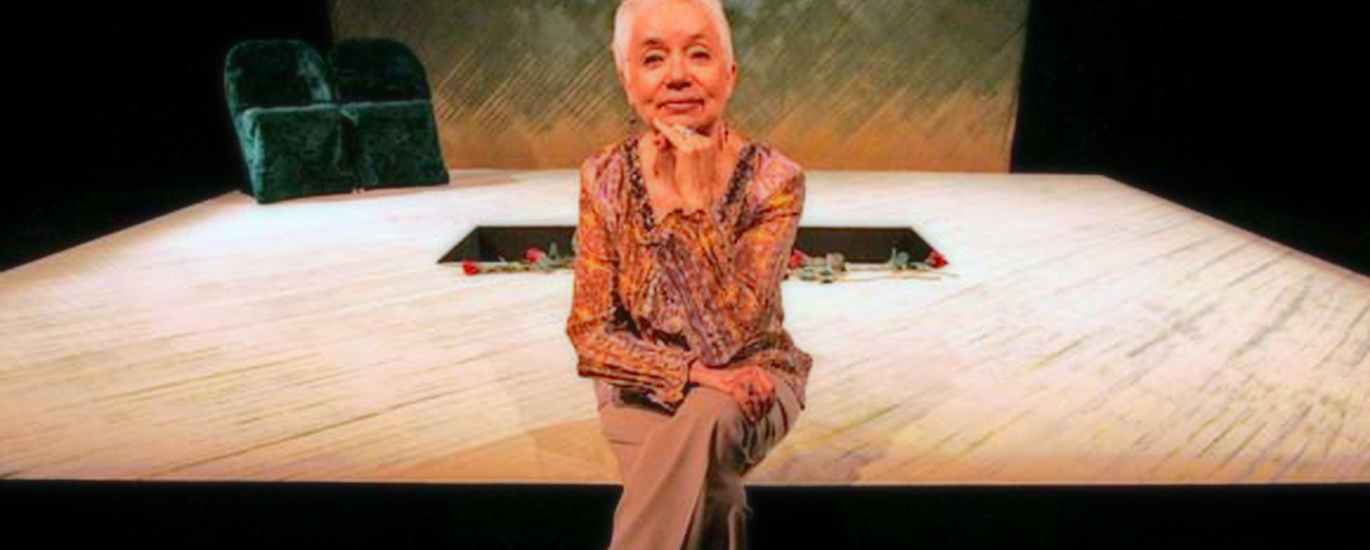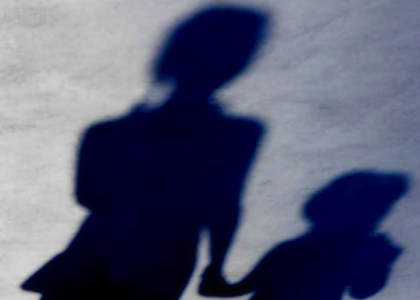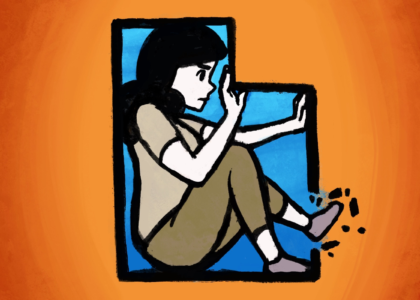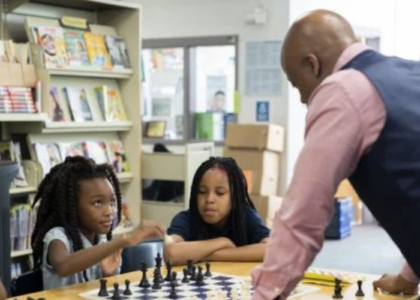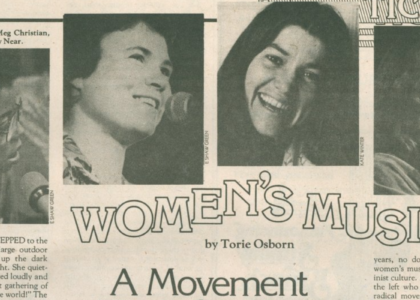“God is love. And that’s it.”
Today we’re going to confront some of the really hard things about being a woman in the LDS faith tradition, and we’re also going to highlight some of the beauty and the goodness and the moral rightness that is found there in the Church. To demonstrate one aspect of the many complicated factors of what it felt like to be a Mormon, here’s a scene from my house when I was little:
In the 1980s, my family drove a huge blue Suburban. My younger siblings and I would listen to cassette tapes in the Suburban on road trips and we would listen to the same things over and over and over again. One of the classics was a musical that was called My Turn on Earth. It came out in 1986 and it was about a girl who lived with God and with the whole human family before being born in a human body on earth. What I got from that is that my soul could have come down to earth anywhere. I could have been born into a body of a rich aristocratic family and friends. I could have been born in a slum in Brazil. I could have been born into a Muslim family in Egypt or a Buddhist family in Thailand. And so my whole life, anyone I see anywhere, I have had an awareness that that person could just as easily have been me.
Every single person that I meet was at that big family meeting before humans came to earth, so we are all siblings, even if we don’t remember each other. This way of viewing other people is at the core of who I am, and today I am so honored and so excited that on today’s episode I’m joined by the author of My Turn on Earth, Carol Lynn Pearson.
Our Guest
Carol Lynn Pearson
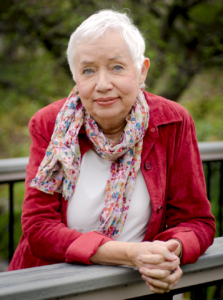
Carol Lynn Pearson (she/her) has been a professional writer, speaker and performer for many years. Several of her poems have been widely reprinted in such places as the Ann Landers column and Chicken Soup for the Soul as well as college literary textbooks. Her autobiography, Goodbye, I Love You, tells the story of her marriage to a homosexual man, their divorce, ongoing friendship, and her caring for him as he died of AIDS. This story made her a guest on such programs as “The Oprah Winfrey Show” and “Good Morning, America,” and she has been featured in People magazine. Pearson has written numerous plays, books, and educational motion pictures. Pearson holds a master’s degree in theatre, is the mother of four grown children, and lives in Walnut Creek, Calif.
The Interview
Amy Allebest: I’m so excited to have you here and I could talk for hours about the positive messages in My Turn on Earth. I know that’s maybe not your most famous or maybe not your most impactful work, but I wanted to start out with that one because it was personally so meaningful to me. I’d love to talk about some of your other highly influential works and even have you read some of them for us, but to start us off I’d love to get to know you better and have our listeners get acquainted with you. Could you tell us a bit about yourself? Where you’re from and kind of what makes you you?
Carol Lynn Pearson: Sure. Originally, Amy, I am from heaven. My turn on earth began as all of our turns, with all these ancestors that brought us here. My ancestors, all of them for the immediate generations, were Mormon pioneers and so that infused my mind and my heart and my work. I have ancestors on a wagon train and in the Mormon Battalion and on the ship Brooklyn, so I myself have been deeply immersed in Mormonism and have experienced, as you explained, all of the beauty and all of the pain. And why I am still here is complicated, but I really feel a great calling to be here. I still appreciate all of the great stuff that is there, and I know that I—with you and many others—have a particular calling: helping us move further along on the territory because where we are right now is not necessarily “this is the place.” This is the place where we are at this moment, and there is a better place ahead for us. You and I and many, many others are assigned or invited to help us find it.
AA: That’s beautiful.
Can you tell us a little bit about how you first related to your faith? When you were born into the church was it a very happy experience for you, kind of simple? And then at what point did you start to realize there’s pain here too? Can you tell us a bit about that?
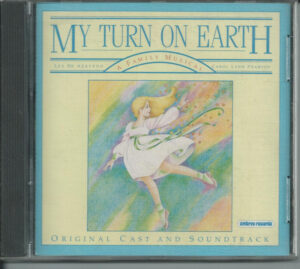
CLP: Well of course, where you’re born just seems to be the world and you don’t know anything else. I have this nice warm cushion. We have these great truths. We have this great history. And I had no reason to question anything, but I really believe that I came here with an already developed feminist consciousness.
It was in high school that I remember specifically just looking around and saying “I’m one of the smart ones here. I’m one of the really good ones here. But for some strange reason, I am—in the eyes of God the Creator and in the heaven that I will be reporting to down the line—I am something of a second-class citizen.” And that was just in the air that I breathed because maleness ran everything. Then (and I tell this little story in The Ghost of Eternal Polygamy) in high school when my much-loved seminary teacher bore us his testimony, speaking of his second wife that was now his eternal companion along with the first wife who had passed away, bearing us his testimony that this ‘plan of eternal polygamy’ was so essential, and that all of us as we go along will come to understand why this is God’s special way of creating future rules for us, and noting that “yes, you young women might find this not very attractive, but as you grow in understanding and become less selfish you will understand this principle and yearn to live it.”
I remember walking home from school that day and that was the first time I really felt a schism between me and God. I thought “wow, if that’s true then there is something wrong with me because I do not fit in that. I do not accept that.” So for many years there was this tremendous struggle: the system tells me this, my heart and my mind tell me this other thing. And the struggle was painful, very painful. Somewhere along the line I was able to say to myself “you know, it’s not me and my mind and my heart that are wrong. I’m not saying that I know everything, but there is something in the system that I have been breathing and eating and living in and trying to understand for all these years–there is something in the system that is wrong.”
And that’s a very brave thing to do. That’s pretty scary, but that is a better option than saying “oh, all of this stuff that doesn’t make sense is correct and the way that God wants it, and I’m the one that’s wrong.” How can one live with that?
Anyway, that’s a little bit of my early history.
AA: Can you tell us, just to kind of be able to place your life, where did you grow up? And about what time would that have been that you were in high school and having that epiphany?
CLP: Sure, I was born in Salt Lake City. When I was eight we moved out to the Uinta Basin. We lived in Gusher, Utah—a tiny little town—for 5 years and then we move to Provo where I finished my growing-up. I went to BYU where I got a Bachelors and a Masters in Theater. I had wonderful experiences there: really good professors, great friends, wonderful opportunities. And that’s how I was launched here, and all of the wonderful plays that I was able to be in have informed my vision of life.
You know, I got to play Joan of Arc on the stage, at BYU in the Joseph Smith Memorial Auditorium building. And that, of course, along with so many other powerful roles that I got to play, is still there, feeding my cells and helping to participate in making me feel more than I might have been. I’m really grateful for all of that.
AA: Yeah, I mean it is really amazing. You said you were kind of born with a feminist consciousness. Did you find any other kindred spirits either in high school or in college at BYU? Was there any sort of feminist presence there at BYU? And again tell us the decade because I have as a landmark like, Simone de Beauvoir’s The Second Sex came out in the United States in the early 50’s and then Betty Friedan with The Feminine Mystique in ‘63 and then the second wave of feminism…when were you at BYU and did you have any other friends who were thinking in similar ways at the time?
CLP: I was at BYU from ’57-61, then getting my Masters in ‘62. I do not have any memories of friends who were really committed to thinking about feminism; all that seemed to happen a few years later. After I got my Masters I taught school for a year at Snow College, traveled for a year, came back, met my very dear, queer husband (that seems to be a part of my foundational story that most people know about) who insisted on publishing that first little book poems called Beginnings…so during that time I began to sense and participate in the foment that was going on. And then I made connections here and there with other women who were thinking about all these things, and the first women’s group that got together as ‘naughty women’ to discuss these things…so it just grew from there.
AA: As you were getting together with other women and as there was foment happening in the broader culture, at that point was Church leadership already starting to push back against that cultural trend in the second wave? And if so, how did you respond to that tension between what you were feeling in your heart, which was being reflected in secular culture, and then the other feeling in your heart, which is ‘I love this faith tradition’? How did you reconcile that?
CLP: I guess everything that happened around the Equal Rights Amendment may have been the first really official thing that I saw. I did give a short statement before the Utah legislature on behalf of the Equal Rights Amendment and I had written a letter in response to somebody at Church Education that had asked me for an opinion. There were several things going on at that time that put me in a vulnerable place. I was not aware of this, but at that time I was on the blacklist. I had become something of a presence because, for whatever bizarre reason, my little book of poems (Beginnings) took off and my name was pretty much known in so many places in the Church and used by the brethren. So I did find myself right there in a very painful place of being at odds with the Church, having their condemnation for participating in this. As one of them would put it, they had loved my writing, my poetry, for so long, but now that I had joined the ‘Women’s Lib Movement’, as if you’re baptized into that or something, they could no longer support me.
But I have never had any bishop suggest that there should be a court held on me. I have watched all of that happen over the years and I don’t know…I’ve just been protected, I guess. And I have been very careful. I have not ever attacked anybody personally, but I’ve said some very very strong things. I have been very lucky to have really good and understanding bishops and especially stake presidents. I love these good men and I’ve been lucky that they love me.
AA: That is lucky. And it’s lucky for all of us who have benefited from your work that you’ve been able to….I was going to say “slide under the radar” but that’s not what you’re describing. You’ve been very much on their radar, but for whatever reason you’ve been protected from it.
CLP: Indeed. Some of these more controversial books…I sent copies of The Ghost of Eternal Polygamy to all of the General Authorities, along with a copy signed to each wife.
AA: Did you really? Wow!
CLP: Similarly, I sent copies of Finding Mother God to all the General Authorities, the 15 major ones in Salt Lake and the top women leadership. So I’ve not been hiding anything that I’ve done.
AA: What was the response? Did you hear back from them?
CLP: Nothing. Nothing. I didn’t expect to receive anything. I know that they just cannot make a response to anything that might even be slightly controversial.
AA: Of course, because then you could publish it online and then they’re in hot water.
…they had loved my writing, my poetry, for so long, but now that I had joined the ‘women’s lib movement’… they could no longer support me.
CLP: I have reason to believe that there was conversation, especially about The Ghost of Eternal Polygamy.
AA: That’s great because I would like to get to that book and talk about it. But first, I’d like to highlight a few of your different works. I’d love to start first with a piece that you wrote called “A Walk in the Pink Moccasins.”
CLP: A little introductory statement that I make here: men cannot possibly know what it is like to be a female child in a motherless home unless they are shocked into glimpsing what it would be like to be a male child in a fatherless house or home. I have had, for years, a kind of Walter Mitty daydream in which I teach them. I become one of the presiding sisters speaking to the ‘boys of comparable age’ (you know, that used to be a thing. We had deacons, teachers, etc…and then we had the ‘girls of comparable age’. That was way back then when that was a thing).
Okay here’s the little speech:
“My dear, young brethren,
It is such a delight to be able to speak to you today. Your faces and your clothing look so clean and fresh. I know that our Mother in Heaven is pleased as she looks down on you this day.
I want first of all to convey to you the fact that our Mother loves you. I am persuaded that She loves you just as much as She loves her daughters, and I hope you can believe that. What a marvelous plan She has laid out for you! What a glorious role you are called to fill!
How you must have rejoiced in spirit as She created the earth and placed there Her crowning creation: Eve, the first and perfect woman. Of course, our Mother could see that her work was not complete, that Eve needed a worthy helpmeet to assist her in the great work she was called to do. This is where you come in, dear brethren.
A rib from Eve’s own body was fashioned into the body of Adam, and he was given to her as a friend and helper. What a glorious and noble calling! So important was he to Eve, and so important the commandant her Mother had given, that even when Adam sinned because he was deceived Eve knowingly sinned with him so they could remain together.
Over the centuries how you must have rejoiced as the plan unfolded further through the great matriarchs—Sarah, Rebecca, Rachel—as our Mother’s holy prophetess has continued to reveal her words to us as woman after woman was sent to do important work, making us all better people so that we can bless the lives of our husbands and children.
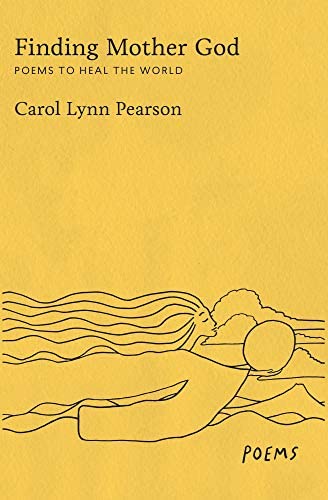
Keep yourself clean and pure, dear brethren, that one day one of our Mother’s choice daughter’s might look with favor upon you, claim you as her own, and give to you the glorious privilege of serving as her helpmeet, adding glory on to her as she adds glory unto the Mother.
Do not listen to the voices that cry out to you from the world. We are living in dark and evil times. Satan herself desires you. Do not listen to the voices that tell you you are suppressed, entice you to a thing called ‘full personhood and freedom’. The role of man has always been made clear by God Herself. The place he occupies in our Mother’s plan is not in question. It is now, and always has been and always will be, to stand by the side of woman, assisting her in the work she has been given to do.
It is true that new doors are opening for man to contribute in many fields besides his primary one, and we are glad when a man shows talents and abilities in a wider range of services. We encourage this. We are proud of the achievements of our fine young men. And as the light of our Mother grows brighter in this world, we learn even more of the glorious truths concerning manhood as it is intended indeed to be a partnership with woman. In fact, one of the truths of our age—and I believe with all my heart this is a truth, even though it is not official and we don’t want to talk much about it—somewhere we’ve a Father there.
Imagine. Somewhere we’ve a Father there.”
In my daydream, when the dust of the shock settles, the men who have just heard what I said nod their heads and say “I see.” And they’re never quite the same again.
So, that is somewhat dated. There have been various significant, and sometimes just very nuanced advances on this subject, but nevertheless the heart of what I just read to you is essentially what we all received as a little girl growing up and as women today.
AA: It certainly is.
CLP: And we, right now, have tremendous opportunity in this space of now, that in our church, in our nation, in our world, the paradigm is shifting. It is. The paradigm of maleness being supreme and femaleness being auxiliary…that paradigm is being challenged.
In fact, since I brought up that word, I want to read one of the tiny little poems here in Finding Mother God that’s called “Paradigm Shift.”
Paradigm Shift
After 359 years the Pope acknowledged
that heretic Galileo was right and
the sun does not revolve around the earth.
How long will it take men of the earth
to acknowledge the we heretic women are right
and the female does not revolve around the male?
For we too have scoped the heavens
revealed the center, can testify
of the brilliant celestial bodies, and lo!
the Heavenly Him and the Heavenly Her
do no orbiting, no presiding, no ranking
are perfect partners in a slow dance
so close you would observe
that they are One.
I think that paradigm shift is really more important for our day-to-day lives than the paradigm shift that Galileo brought in. When we have ‘maleness at the center of the universe’ it affects everything and everybody’s life, no matter who they are or what they do. It’s in the air that we breathe.
So this is a very exciting time, and women—with the men who also feel called to this task—are participating in a very sacred paradigm shift and essential to that is revisiting the gender of God. It’s not just sort of bringing in this sweet little Heavenly Mother that’s been hiding over there in the corner, it’s understanding that god-ness is equally female and male, however you want to call it.
We’re in a very fertile, wonderful time and we should be thrilled that we get to do the work that is bringing in the future.
AA: Tell us a little bit more about the book that you just read from, Carol Lynn. Is it called Finding Mother God? Can you tell us about what led you to write that book? And if you’d like to read any more from it, I would love to hear another piece or two.
CLP: This is my most recently published book, Finding Mother God: Poems to Heal the World. This little book was not born in anger, but it was conceived in anger. I go to, occasionally, this fireside that’s held here in Berkeley and on this one occasion a gentleman came to speak, a scholar, and he was talking about women in Mormon liturgy. I thought, “okay, that’ll be fascinating.” The whole thing…I’m not blaming him, I’m blaming the fact that everything he brought was so discouraging, so distressing. At the end, they had a question and answer period, and I said, “listen, what’s it going to take before any of the brethren address one of the most essential issues that we have, which is to question the gender of God?” He said, speaking truthfully, “I don’t believe any of the brethren in Salt Lake have any interest in doing the heavy lifting that would be required to address this subject.”
When we have ‘maleness at the center of the universe’ it affects everything and everybody’s life, no matter who they are or what they do. It’s in the air that we breathe.
Oh, I left that meeting and I sensed that what he was saying was true, that nobody cares enough to do the heavy lifting. And the friend I drove home with, she was angry too. I talked to a number of women who were angry. I was so angry that I cried the next day. I was so angry that I grabbed a notebook and I wrote out a little poem, and then the next day I wrote two, the next day I wrote another one. Before I knew what I was writing…you know this collection of poems, it’s not poetic poetry. Many of them are just little thoughts that are constructed in such a way as to really grab you. I just continued to write these and before long I realized I’m not angry anymore, I’m excited. I’m really excited because, as I put on one of the first pages of The Ghost of Eternal Polygamy, when I started that book I wrote, “I’m not angry this morning. I have been angry, but I have learned that anger is good as a fuel but it is not good as the destination.”
Actually, you will find a lot of love in The Ghost of Eternal Polygamy and you will find a great deal of love in Finding Mother God. These are just a couple of the contributions that I have been given the opportunity of making. It’s been really, really thrilling.
AA: That’s wonderful. I love hearing about the generative force of anger. I think sometimes, especially as women, we’re so conditioned to not even feel anger, right? As Christians, everybody is, regardless of gender, but specifically women in our culture…we’re not supposed to demonstrate anger. We’ve talked about that on past episodes of the podcast, that anger isn’t always a bad thing, that it can be used as a constructive force, so I appreciate that story.
Is there a piece from Finding Mother God that you’d like to read or talk about?
CLP: Let me read this longer poem. I’ve been thinking about this one because…you know, the news is so heavy these days that the other day I just put on my DVD of Mary Poppins—which is maybe one of my favorite all-time movies—and I think it is a profound movie. I would like to just share with you the poem, it’s a longer narrative poem, I think it gives us a vision of where we are and the importance of what we’re doing. Last night, actually, I watched (and I had seen it before but I wanted my son to see it) Saving Mr. Banks. It’s the story of how Mary Poppins got made by Disney. A wonderful, brilliant movie. All of this is themed to transforming patriarchy. Mr. Banks, the father to these little children that Mary Poppins visits, he represents the patriarchy and he’s transformed.
Our Mother in the Movies
Surely you must have noticed in
Disney movies, along with the catchy songs
all the dead mothers.
Mother of Ariel—killed by pirates
Mother of Bambi—shot by hunter
Mother of Belle—died from plague
Mother of Nemo—eaten by barracuda
Mother of Tarzan—killed by leopard
Mother of Quasimodo—killed protecting her son
Mother of Cinderella—dead
Mother of Pocahontas—dead
Mother of Snow White—dead
Suspicious, don’t you think—such a
stunningly high rate of maternal mortality
in one subdivision?
It cries out for an investigation
which is why I did one
and here are my findings.
We are the guilty party, you and I
and our ancestors way back before a camera
was even a flash in someone’s dream.
The storyteller of the tribe is a medicine man
to our psyches and knows our substrata terrors
and our needs and draws them into words
and sometimes, if we are lucky, brings remedies
as in this case, the Tale of the Missing Mother
and the Miserable Patriarchal Family.
Here we are in the dark, popcorn in hand, fathered
before the large and flickering fire we call a screen
ready for a brilliant show and tell.
Actually two stories to tell today, the better to demonstrate
my dear, this pandemic malady of ours, on a split-screen
which you can do because this is the movies
and which I can do because this is a poem.
Shhhh. Act One: The Motherless House.
Screen One: Captain Von Trapp, military man of Austria
keeps order with whistle (dead mother, seven children
good little soldiers, sad, sad, sad).
Screen Two: Mister Banks, agent of Fidelity Fiduciary
lord of his castle (mother out marching for votes for women
two children, Jane and Michael, sad, sad, sad).
What can help but heaven? And heaven opens!
Down from the hills comes the aproned woman of song
with the holy name of Maria, sent by God
and the Mother Abbess to set the family right.
And simultaneously—
Down from the London sky by umbrella
comes the woman of magic
with the holy name of Mary, sent by God
and the east wind to set the family right.
(I know! For a minute there I was believing that
Julie Andrews was actually our Heavenly Mother!
But no, just one of her beautiful daughters
who got two fabulous roles.)
Act Two: The Woman Turns Things Upside Down.
The Von Trapp children climb trees
verily the Tree of Life, and warmth
and music return to the home
and a smile to the lips of the Captain.
How do you solve a problem like the Goddess?
You marry her in a grand cathedral blessed by nuns
and bring healing to the family mortal and divine
and she fortifies the Captain in his courage to
say no to the fatherland, no to the motherless house
of the ultra-patriarchal brownshirt Nazis.
And simultaneously—
Poppins unleashes her magic, a lullaby
a spoonful of sugar and a trip to make-believe
where we levitate and love to laugh
and step in time with chimney sweeps and see
that Mary is indeed practically perfect
every day and in every way
and we want to feed the birds with our tuppence
rather than invest in Incorporations! Amalgamations!
of the highly patriarchal Fidelity Fiduciary Bank.
Act Three: The Healed Family Rises.
And now in this dark theater we celebrate
as we see our way, feel our way with
the family Von Trapp stumbling and rising
climbing, climbing the high green mountain
—up, up, closer, ever closer to heaven.
And look!-the Banks family flying the kite repaired
by father’s own hands and trailing mother’s
“Votes for Women” banner, useless now
except as a tail to stabilize the kite as it rises
—up, up, into the blue and white sky.
And our communal psyche, stirred by the storyteller
of the tribe, whispers to the full theaters, Yes, yes,
something holy just happened here.
Wholeness and holiness happened here.
AA: That was just brilliant and powerful. Thank you.
There are two other works of yours that I want to make sure that we talk about today. One of them…you mentioned earlier in the episode that you met your ‘adored queer husband’ and some of our listeners may be familiar with that part of your story, but some might not. I’d love it if you would talk just for a minute about perhaps your marriage, or perhaps we could approach it through the lens of your book?
CLP: The book that tells the story of my life with my husband, and was published in 1986, tells the story of our marriage: Carol Lynn and Gerald, in the Salt Lake Temple, for Time and Eternity. We had had a conversation about his homosexual desires and some experiences, but that’s not who he really was. He knew that. He loved me as absolutely best as he could and I certainly did love him. I really felt, as did he, to move forward with this. We had, in so many ways, a really good marriage, but he learned early on that his inner workings had not shifted. But neither one of us wanted to end the marriage, and after our years in Provo, our four children, it was difficult realizing that we might need to make a huge shift, we moved.
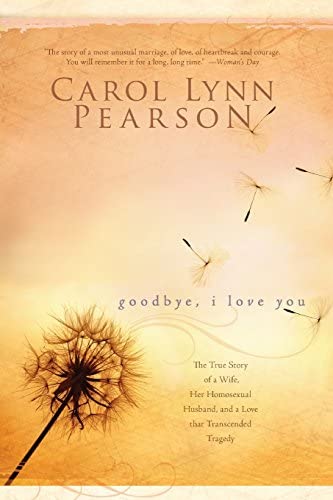
Part of the reason was that I didn’t want to play out a possible divorce in Utah, because I was quite a public figure at that time. So we moved to where I am living now, in Walnut Creek, California. After 4 years of trying so hard to find a way to salvage the marriage, we decided to divorce and remain good friends, which we did.
A few years later, Gerald passed away from AIDS. That was in 1984, and I was taking care of him at the end of his life. I never ever ever thought, and we never had a conversation, that I would ever write our story. It was just too shameful. But soon after his death, it occurred to me that he and I had both learned an awful lot and that there was so much ignorance and pain going on in general and in the country, and certainly in our Mormon community, where this subject…you don’t even know how to talk about it.
So I did determine to write our story. I got an agent who sold it immediately to Random House in New York, and they published it under the name Goodbye, I Love You. They sent me on an eight-city tour; I was on Oprah, I was on Good Morning America, on all the big morning shows. It was one of the very first things in Mormondom that opened the conversation on this subject in any kind of compassionate way. I know that that book, over the years, has been of tremendous benefit to an untold number of families and individuals. I continue to hear from them even now. So that’s the story of that.
AA: And then you decided to write the subsequent book, No More Goodbyes: Circling the Wagons Around our Gay Loved Ones in order to reach a wide audience as you saw that this was happening in a lot of families?
CLP: I had written the stage play called Facing East about the story of a good upstanding LDS family dealing with the suicide of their gay son. That play was very widely seen and given recognition in Utah. The Deseret News gave it the award for best play of the year tied with Hamlet at the Shakespeare Festival that season.
I knew that I’d have an opportunity to shine the light again on this subject because of that play. I hadn’t done anything really since Goodbye, I Love You, so I gathered stories about families letting nothing come between them and their gay loved ones. That was the essential thrust of that book, No More Goodbyes.
I sent a copy of that book to all the General Authorities, and actually I did get about three thank-yous from some of them.
AA: That’s good to know. What are your thoughts on what’s happening recently with the Church? This has been a huge point of schism within the Church, between those who are really re-entrenching in that anti-LGBTQ stance and those who want the Church to move forward.
CLP: I just observe what you just described, and I know that ultimately progress and kindness and understanding and inclusion win over discarding people who frighten us.
This is not an easy, quick thing, this is a long haul. In the meantime we do day by day what is in front of us and take risks to do just a little bit more than we feel comfortable with. If everybody listening here took advantage of everything that happens to come into your possibility of your affecting it, and then deliberately went a little bit further to a little bit less of a comfortable place, I think that’s how we make progress.
I have no condemnation at all for all of the good people that I know who have said, “wait a minute, I don’t think there’s any progress to be made in this organization. I’m going to go out where I can find a place where I can do good work and feel more comfortable.” There’s a part of me that could say that, but I feel that I belong right here where I am. I’m not going to allow anybody to tell me that I don’t belong here, and they haven’t. You know, my ward loves me! Isn’t that amazing? You know, it can be seen as a modern-day Mormon miracle that my ward and my stake have been so extraordinarily good to me.
There was so much ignorance and pain going on in general, in the country, and certainly in our Mormon community, where this subject…you don’t even know how to talk about it.
AA: That is amazing. I am amazed by your sovereignty and your confidence in doing what you know in your heart is right. From beginning to end that’s what I just keep being struck by in your story. I think as you’re challenging people to go into that zone of discomfort, I think so many people feel discomfort because it’s either the judgment of others, the judgment of their families and their communities, and human beings are such social creatures that it is very uncomfortable for most people to not be conforming to the status quo and to have the disapproval of people that you love and admire. Your own parents. The people you were taught to to follow. And so that discomfort is truly so painful, and that’s why people who are willing to endure that are so admirable. It’s such difficult work, but if you know in your heart that it’s true…
I mean, we learn in the Church also—and I have to say, because I started out the episode by talking about the positive things that we learn in the Church—I learned to have integrity in the context of the Church. I learned to be honest about what I really thought and to be kind to others, and to follow what I believe was coming from God. So we get these mixed messages and at the end of the day we have to do what we think is right.
CLP: I know! It’s a crazy-making richness, what you just described. It is a crazy-making richness of opportunity because I don’t want to leave our Church. Because I have been called to be on the front lines. You know, Mormondom presents a wonderful front line of engaging with patriarchy.
Nobody that I know of wants to replace patriarchy with matriarchy. The goal, my stated goal, is to assist in transforming patriarchy into partnership. That’s worth fighting for, and I’m grateful to be on the front lines. I think that’s where the best work is done.
AA: I love that. It’s also inspiring to hear someone who definitely knows where their work is and I appreciated you also saying that you don’t have judgment for those who feel a calling to be brave by leaving, right? There are those who feel called to be brave by staying, and those…
CLP: Absolutely, without questions.
AA: We have to be true to what we feel in our hearts is right, so I appreciated that as well.
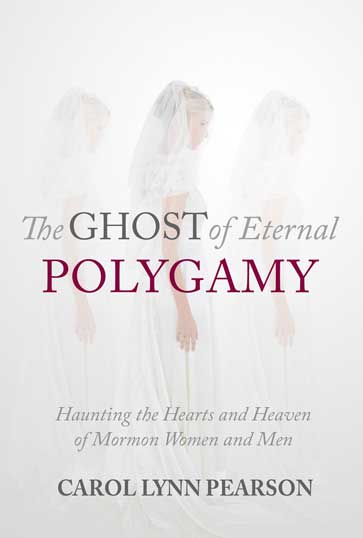
Okay, one last book to talk about Carol Lynn. You’ve provided us so much material that we could draw from that we could be talking for hours and hours, but one last book that you referenced several times so far in the episode, and I want to make sure we get to, is The Ghost of Eternal Polygamy. Listeners who are not well acquainted with Mormonism or have never been in the LDS Church might be more well acquainted with LDS polygamy just from watching Under the Banner of Heaven, or there was also a documentary recently about the Warren Jeffs branch of the Fundamentalist LDS Church that’s called Keep Sweet: Pray and Obey that just came out too. There’s been lots of buzz about polygamy; it comes up in the news every few years. But I personally was really struck and very moved and grateful for your book, and even just the title I thought was so well put, that it is a ‘ghost of eternal polygamy’. That sense of being haunted. That you can be going about your life and everything’s fine, but just in the back of your mind there’s this nagging feeling of but what if that’s true?
I guess it wasn’t just a what-if for you, you said you had an ecclesiastical leader who was preaching that it was absolutely going to be true that you would all be plural wives in heaven. So tell me a little bit about that book?
CLP: Well, if we were righteous enough…because it was an understood thing that if you were righteous enough to be in the top layer of the Celestial Kingdom where gods are made, that that is how it happens. And that God himself is an eternal polygamist. Nobody likes to touch that now because it’s so icky. It’s just so icky. But it’s still in our psyches because nobody has ever said “wait a minute, that is not true.”
I propose that in the psyche, somewhere in the back of the psyche of every devoted Mormon woman and somewhere in the back of the relationship of every devoted Mormon couple, there is a little bit of unsettling something, that troubles a lot of men, but primarily troubles women. And you know that’s why I wrote The Ghost of Eternal Polygamy, because I saw year after year after year the damage that is done to women’s sense of self and to marriages also. So I sent out this survey that ultimately had over 8,000 people take it, and I got a couple of thousand stories, all anonymous, and from those stories I chose the ones which demonstrated the different ways in which today in our Mormon marriages, in our Mormon female psyches, the ghost is very much alive and doing such damage.
It really puzzled me. I love seeing all of the activity that’s going on around bringing back the concept of Mother in Heaven. There’s a lot and it’s not going away, but I’m personally sort of surprised that there’s not that much passion about addressing this subject that every one of us has to deal with some way or another: that if we’re sufficiently righteous, eternal polygamy is very likely what we will be experiencing in eternity. To me, that is emotional, spiritual violence that demands to be addressed. I wish that everybody would start talking about it, that there would be an uprising against this subject.
Today is not a good day for any organization, any church, to try to defend the emotional, spiritual abuse of women. I say without any hesitation that the concept that is sealed in the air that we breathe in the chapel, in the water that we drink in our sacrament, all of these concepts of how the feminine and masculine relate to one another are all polluted with the concept of eternal polygamy. I just wish the passion that I felt and that I continue to feel, that drove me to write The Ghost of Eternal Polygamy, could somehow catch on fire. I don’t know what it would look like, but I think our organization needs to be called to account for the pain that exists in Mormon marriages, for how women have written to me saying that they withhold love from their husbands because they have this vision that sometime, somewhere they’re going to have to share him with somebody else. One of them wrote “I hold back a little so I’ll have something of myself left when that time comes that I have to see him with another woman.” That is vicious.
I want to say as clearly as I can that that is vicious. It is violence. That is emotional and spiritual abuse of women, and it ought not to happen today no matter whose Church you’re looking at.
AA: Amen.
CLP: I do not believe for one moment that God had anything to do with Mormon polygamy.
I’ve had women send me thank-you emails and cards saying, “wow, you’ve shown me a way that I can stay in the Church and throw away polygamy, because I thought I’m going to have to leave this Church, I’m going to have to leave it because polygamy is so damnable.” But having read my book many people say, “I feel now that if I choose, I can throw away the concept of eternal polygamy and truly believe that God had nothing to do with it and maintain the good things and maintain the position that I wanted to maintain in the Church.”
I say without any hesitation that the concept that is sealed in the air that we breathe in the chapel, in the water that we drink in our sacrament, all of these concepts of how the feminine and masculine relate to one another are all polluted.
I first of all have to ask everybody to consider the idea that that was just an error from the get-go. That takes an awful lot of weight off of me. I think mothers, no matter how they fall on this, can talk to their daughters and say, “listen, I want you to trust your own heart and your own mind before you trust anything else.” Trust our own authority. We’re sort of asked to give away our authority to those who really have authority, and that screws everything up pretty badly just by virtue of who we are, of being divine entities, offspring of the divinity that is equally female and male. We have authority and we need to utilize that in a way that is consistent with the highest principles of everything Jesus taught and the highest principle of everything is love.
Now, I suggest that Mormon polygamy does not have anything to do with love. It has to do with control and with some bizarre form of male advancement, but it does not have to do with love. And if we can keep the concept and the feeling of love as we evaluate all these things that we’ve been talking about here and just say, “does that pass the love standard? Does that sound like it came from the heart of a god of love?” And not say “well no, it doesn’t feel right but I know that once I get over there I’ll come to understand it.” That’s not good enough. It’s not good enough. We have to find things that here and now, right now, feel clear, correct, and loving. And godly, because God is love. And that’s it.
AA: And that’s it. Here, here. That is a perfect way to wrap up our conversation, Carol Lynn, I couldn’t agree more.
I actually wanted to end with the song that I grew up singing with my siblings and my friends as an earnest little Mormon girl. This song is about love. This is another one that Carol Lynn Pearson wrote that is really at the core of who I am. It’s called “I’ll Walk with You.”
And it is about that love, about seeking out those on the margins, and I’ve been to several events that are kind of Mormon outreach to LGBTQ people, and this song is always sung at these meetings. It’s a beautiful, beautiful song, so we’re going to present it at the end of the episode. But before we go I just want to thank you for your rich body of work that’s had such a positive impact on women especially, but upon the whole faith tradition and moved things forward so that the next generation can pick up where you’ve gotten us to, and take it forward, as you said, to new territory, to better, more loving territory. So thank you for all you’ve done, and thank you for being with us today, Carol Lynn.
CLP: Oh, thank you, thank you very much, Amy. And to all those who are listening, I know that you have your own vineyard that you have been given to tend. And whatever it looks like, let us just do it well.
The Heavenly Him and the Heavenly Her
do no orbiting, no presiding, no ranking
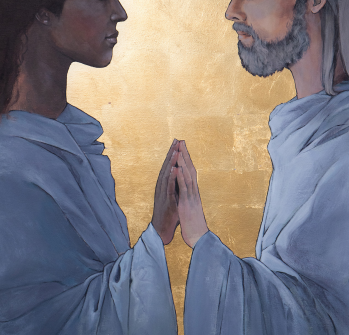
are perfect partners in a slow dance
so close you would observe
that they are One.
Listen to the Episode
&
Share your Comments with us below!

